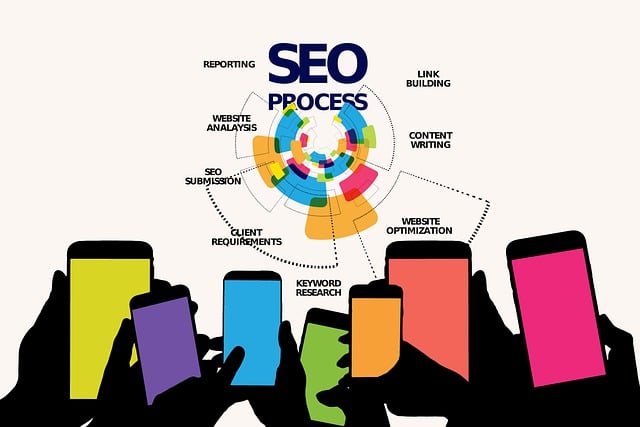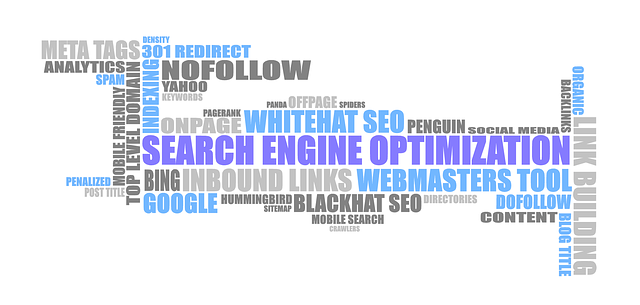Off-Page SEO is a strategic approach that boosts website rankings by engaging in activities outside its direct control, focusing on building high-quality backlinks from reputable sources, social media engagement, and online reputation management. Key components include link building through compelling content, guest blogging, influencer collaborations, and diverse backlink profiles. Social media platforms are crucial for driving traffic and brand buzz, while influencer marketing enhances credibility and links. Monitoring performance using tools like Google Search Console is vital for understanding and optimizing website visibility. As the digital landscape evolves, Off-Page SEO must adapt to trends like voice search, AI assistants, improved user experience, and data-driven insights, with quality backlink acquisition remaining a core focus.
Off-Page SEO is a strategic approach that enhances your website’s authority and visibility beyond your site’s boundaries. This article delves into the intricate world of Off-Page SEO techniques, providing a comprehensive guide for digital marketers. We explore key components like building high-quality backlinks, leveraging social media, influencer marketing, guest blogging, and performance monitoring. By understanding these strategies, you can navigate the landscape of online search algorithms and stay ahead in today’s competitive digital market.
Understanding Off-Page SEO: Definition and Relevance

Off-Page SEO refers to a set of strategies that focus on improving a website’s search rankings by leveraging external sources and factors beyond its control. It involves actions taken outside of your website to influence its performance in search engine results pages (SERPs). This technique is essential as it helps build the website’s authority and visibility, making it a crucial component of any digital marketing strategy.
The relevance of Off-Page SEO lies in its ability to create high-quality backlinks, which act as votes of confidence from other reputable websites. These backlinks signal to search engines that your content is valuable and trustworthy, thereby enhancing its credibility and relevance for specific keywords. By understanding and implementing effective Off-Page SEO techniques, businesses can improve their online presence, attract organic traffic, and ultimately boost their search engine rankings.
Key Components of Effective Off-Page Optimization

Off-Page SEO is a strategic approach that focuses on activities outside your website to enhance its visibility and search rankings. It involves a multitude of components, each playing a crucial role in building a robust online presence. One key aspect is link building, where the goal is to acquire high-quality backlinks from reputable sources. These links act as votes of confidence for your site, signaling to search engines that it offers valuable content.
Another vital component is social media engagement. An active and interactive social media presence can drive traffic and create a buzz around your brand. Sharing engaging content, participating in relevant discussions, and building relationships with influencers and industry leaders can significantly impact your SEO efforts. Additionally, online reputation management is essential; monitoring and responding to customer reviews and feedback can showcase your commitment to quality and influence search engine algorithms.
Building High-Quality Backlinks: Strategies and Tactics

Building high-quality backlinks is a cornerstone of effective Off-Page SEO strategies. It involves securing valuable links from reputable and relevant websites, which signal to search engines that your site offers trustworthy and valuable content. To achieve this, focus on creating compelling content that naturally attracts links, such as in-depth guides, original research, or high-quality multimedia assets. Collaborating with industry influencers and other trusted sources can also facilitate backlink acquisition. Guest blogging on authoritative sites is another proven tactic, allowing you to contribute relevant content while earning a link back to your own site.
Diversifying your backlink profile is essential. Aim for links from a variety of domains, including academic institutions, government websites, news outlets, and industry-specific platforms. This diversity tells search engines that your site appeals to a broad audience and covers a wide range of topics. Additionally, ensure that the anchor text used for these backlinks is varied and natural, reflecting genuine references to your content rather than keyword-stuffed links. Regularly monitor and maintain your backlink profile to remove any low-quality or spammy links that could negatively impact your Off-Page SEO efforts.
The Role of Social Media in Off-Page SEO

In today’s digital era, social media plays a pivotal role in shaping Off-Page SEO strategies. Platforms like Twitter, Facebook, Instagram, and LinkedIn offer vast opportunities for businesses to engage with their target audience and build valuable backlinks. By sharing high-quality content, engaging in conversations, and interacting with influencers, brands can increase their online visibility and drive traffic to their websites. Social media signals act as a powerful indicator of popularity and authority, which search engines consider when ranking pages.
Furthermore, social media platforms facilitate the spread of content, often referred to as viral marketing. When a brand’s content goes viral, it can generate a surge in backlinks from numerous sites, significantly enhancing its Off-Page SEO profile. Additionally, active participation on these platforms helps establish a positive brand image and fosters trust, both of which are essential for long-term online success.
Utilizing Influencer Marketing for Link Acquisition

In the realm of Off-Page SEO, influencer marketing stands out as a powerful tool for link acquisition. By leveraging the reach and credibility of influential figures in specific niches, brands can effectively promote their content and secure valuable backlinks. Influencers possess dedicated followings who trust their opinions, making their endorsements highly persuasive. When an influencer recommends a product or service, it resonates with their audience, leading to increased brand visibility and potential links back to the brand’s website.
This strategy is particularly effective when influencers create authentic content featuring the brand. User-generated content (UGC) generated by satisfied customers and shared by influencers can further enhance SEO efforts. Such organic integration fosters trust and encourages natural link building, which aligns with Off-Page SEO principles aimed at establishing a robust online presence.
Guest Blogging: A Powerful Off-Page SEO Technique

Guest blogging is an effective off-Page SEO technique that involves contributing high-quality written content to other websites within your niche or industry. By offering valuable insights and expertise, businesses can establish themselves as thought leaders and attract a broader audience. This strategy allows for the placement of backlinks on the host website, which signals search engines about the credibility and relevance of your brand. Not only does it drive traffic back to your site, but it also improves your domain authority by associating your brand with reputable sources.
Additionally, guest blogging provides an opportunity to connect with potential customers or partners. It helps build relationships with influencers and industry experts, fostering a network that can further enhance your online visibility. The backlinks acquired through this technique are particularly valuable as they often come from websites with established audiences, thereby increasing the chances of ranking higher in search engine results pages (SERPs).
Monitoring and Analyzing Off-Page SEO Performance

Monitoring off-page SEO performance is a crucial aspect of understanding and optimizing your website’s visibility. It involves keeping a close eye on external factors that impact your search engine rankings, such as backlink profiles, social media engagement, and brand mentions. By utilizing tools like Google Search Console, you can track the health of your backlinks, identify any toxic links, and monitor changes in referral traffic.
Analyzing these metrics provides valuable insights into what’s working and what needs improvement. You can assess the quality and quantity of backlinks to gauge their impact on your domain authority and organic rankings. Additionally, monitoring social media interactions reveals opportunities to engage with your audience, increase brand awareness, and drive more relevant traffic to your site.
Staying Ahead: Trends and Future of Off-Page SEO

As the digital landscape continues to evolve, so does the realm of Off-Page SEO. Staying ahead involves a keen eye on emerging trends and an understanding of how search algorithms adapt. For instance, the rise of voice search and AI assistants necessitates a focus on natural language processing and entity-rich content. Additionally, the increasing importance of user experience and page speed impacts the effectiveness of Off-Page SEO strategies; fast-loading, mobile-friendly websites gain a competitive edge.
The future of Off-Page SEO is likely to be heavily influenced by data-driven insights and machine learning. Quality backlink acquisition will remain paramount, but the methods will evolve. This could include enhancing content through interactive elements, optimizing for local search, and leveraging social media signals more effectively. Adaptability and a forward-thinking approach are crucial to staying ahead in Off-Page SEO as it continually transforms to meet the changing demands of both users and search engines.
